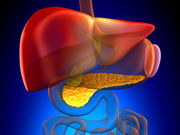Neither extra chemotherapy drug nor add-on radiation aided longevity in French trial
WEDNESDAY, May 4, 2016 (HealthDay News) — Additional treatments for locally advanced pancreatic cancer don’t appear to improve survival, according to a study published in the May 3 issue of the Journal of the American Medical Association.
Pascal Hammel, M.D., from the department of gastroenterology-pancreatology at Beaujon Hospital in Clichy, France, and colleagues focused on 449 people with pancreatic cancer (average age, 63.3 years). All received standard four-month chemotherapy with gemcitabine. About half the patients (219) also took erlotinib along with gemcitabine. After completing initial treatment, imaging tests revealed that 269 patients appeared to have tumors that were under control. About half this group of stable patients (136) received two additional months of the same chemotherapy regimen. The other half (133) was treated with a combination of radiation and capecitabine.
The participants were followed for a median of 36.7 months. The researchers found that median overall survival was not significantly different between chemotherapy at 16.5 months (95 percent confidence interval [CI], 14.5 to 18.5 months) and chemoradiotherapy at 15.2 months (95 percent CI, 13.9 to 17.3 months; hazard ratio [HR], 1.03; 95 percent CI, 0.79 to 1.34; P = 0.83). Median overall survival for the 223 patients receiving gemcitabine was 13.6 months (95 percent CI, 12.3 to 15.3 months), while median overall survival was 11.9 months (95 percent CI, 10.4 to 13.5 months) for the 219 patients receiving gemcitabine plus erlotinib (HR, 1.19; 95 percent CI, 0.97 to 1.45; P = 0.09; 188 versus 191 deaths).
“The French trial demonstrates that routine addition of chemo-radiation following initial chemotherapy for patients with locally advanced pancreatic cancer does not improve survival compared to continued chemotherapy.” Deborah Schrag, M.D., M.P.H., of the the Dana-Farber Cancer Institute in Boston, writes in an accompanying editorial. “[And] given the burdens of daily radiation therapy, there is no routine role for the application of this treatment strategy.”
The study was funded by Roche, the manufacturer of erlotinib.
Copyright © 2016 HealthDay. All rights reserved.








